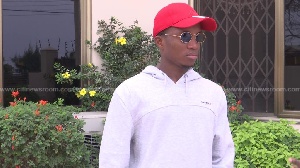- Home - News
- TWI News | TV
- Polls
- Year In Review
- News Archive
- Crime & Punishment
- Politics
- Regional
- Editorial
- Health
- Ghanaians Abroad
- Tabloid
- Africa
- Religion
- Election 2020
- Coronavirus
- News Videos | TV
- Photo Archives
- News Headlines
- Press Release
Opinions of Saturday, 10 November 2012
Columnist: Sakyi, Kwesi Atta
Critical Role of Electoral Commission of Ghana
in the 2012 Elections
By Kwesi Atta Sakyi
4th NOVEMBER 2012
The Daily Guide revealed that the EC on 5th November, made known that 449
Ghanaians were registered in embassies abroad in the Biometric Voter Registration exercise. The question is, why did not this exercise cover all Ghanaians in the Diaspora? Perhaps, the cost and mechanism to identify bona fide Ghanaians abroad could have been prohibitive. Some skeptics have challenged the EC on its creation of 45 additional constituencies in the run up to the 2012 elections.
The matter went to the Supreme Court and the EC won, under the interpretation of the Act 451 which set it up and Acts 47 and 51 of the 1992 Constitution. The EC is composed of 7 members, with Dr Kwadwo Afari Djan as the Chairman. In the 1978 Unigov fiasco, the late Justice Isaac Kobena Donkor Abban was the Electoral Commissioner of the erstwhile Interim National Electoral Commission. He was a very honourable and patriotic Ghanaian. So is Dr Kwadwo Afari Djan.
In the year 2000, when Kufour won the elections, the constituencies were increased from 200 to 230. What is the big deal now in increasing them from 230 to 275? The EC is mandated to create constituencies on account of the population census, so no one should cry foul that the EC is gerrymandering. As of December 2004, the number of constituencies in Ghana was as follows:-
Ashanti 39, Brong Ahafo 24, Central Region 19, Eastern Region 28, Greater Accra 27, Northern Region 26, Upper East 13, Upper West 10, Volta Region 22 and Western Region 22. There are 7 presidential candidates for the 2012 contest, out of whom one is an independent candidate. They are John Dramani Mahama (NDC), Nana Akufo Addo (NPP), Dr Abu Sakara Foster (CPP), Paa Kwesi Nduom (PPP), Henry Lartey (GCPP), Akwasi Addai Odike (UFP) Hassan Ayariga (PNC) and Jacob Osei Yeboah, independent candidate. If there is a tie and there is no clear winner under the simple majority or 50% +1 or first –past -the -post system, then the run-off will be held on 28th December, 2012.
The 2008 elections went for a run-off. This is where floating voters and swing parliamentary seats count. Political parties may then engage in alliances, coalitions, horse trading and logrolling, whereby the leading candidates may enter into deals with minority parties to support them in exchange for perks such as allocating them ministerial portfolios and other benefits. Sometimes, money can do the talking. In that case, the election could be flawed. But then, we should be realistic as a totally fair election is an ideal.
Right now, Ghanaians are in a dilemma and election fixation as the fever of the impending elections is catching on like wild fire. Presidential elections have been held successfully in Ghana in 1960, 1979, 1992, 1996, 2000, 2004 and 2008. Two of the momentous occasions in Ghana’s chequered political history were in 2000 when the NDC lost and handed over power to the NPP, and again in 2008, the tables turned and NPP lost to NDC. 2012 is another big milestone yet to pass. May the best party win? The choice is with the Ghanaian electorate.
The Electoral Commission of Ghana was established by Act of Parliament in 1993, under the 1992 Ghana Constitution as an independent or autonomous body with the sole mandate of overseeing elections in Ghana. Since its inception, the commission has performed par excellence in organizing ensuing elections in Ghana in 1996, 2000, 2004, 2008 and now 2012. Of these, the 2000 and 2008 elections were the top best as they were too close to call. It has become a model of excellence in Africa because of its professionalism and non-partisan stance. Some African countries that I know of have sent their electoral commission staff to understudy the Ghana outfit under the aegis of the UNDP.
In any country, the role and functions of the Electoral Commission include the creation of new constituency boundaries based on population census, conduct of referenda, registration of eligible voters under the principle of universal adult suffrage or one man one vote, organizing and supervision of local government, parliamentary and presidential elections during the tripartite general elections every four years, ensuring that the voters’ register is updated and verified, provision of logistics during elections such as polling booths at designated polling-stations, provision of vehicles to ferry returning officers, remuneration of polling assistants co opted and recruited for the countrywide exercise, accreditation of external and internal monitors and polling agents, notably from the EU, AU, ECOWAS, Carter Centre, NGOs, among others, receiving of electrical petitions and referring them to the courts, registration or deregistration of political parties, organizing voter education and sensitization, acting as referee and umpire in the election exercise, among many other humongous roles. One will agree with me that it is of paramount importance for the government to provide adequate funds to the ECG for them to discharge their onerous and sensitive herculean assignments.
In the 1970s, under the late Lt Gen Ignatius Kutu Acheampong, the issue of Union Government in Ghana was determined through a referendum and the then Electoral Commissioner. Justice I.K. Abban, refused to compromise on rigging the results, and he became an endangered species. He had to flee the country, despite discharging his duties honorably, professionally and in a non-partisan manner. Our current Electoral Commissioner, Dr Afari Djan, is a colossus and titan in the field of conducting free and fair elections in Ghana. His vociferous critics are those with warped vision and perception who only see the trees for the forest. Mr. Djan has been in the firing line of some vocal critics who accuse him of the electioneering malpractice of gerrymandering or creating and fixing new constituency boundaries to advantage one particular party. It is only the unlearned and illiterate who will pander to such myopic accusations.
Dr Afari Djan has followed the fine tradition of distinguished civil servants which Ghana has produced, recalling to mind greats like Dr Robert Gardner, Dr E.K. Debrah, Justice Aunan, E.L. Adu, Mr. Sam Awotwe, among others. Lest I forget, the ECG is the only body in Ghana empowered to authenticate and announce election results and declare the winner of elections. Those radio stations which go ahead to announce results before the results announced by ECG, contravene the Electoral Act. In the past, some polling agents of the political parties have caused unrest and kerfuffle at polling stations. The law states that on the day of elections, no political party colours or symbols shall be displayed at or near the polling stations, and no act of treating or seeking to influence potential voters shall be entertained.
Political party agents and independent monitors and observers have to make their own logistical arrangements concerning transport, food, remuneration, among others. No one shall be entertained in obstructing justice or trying to give directives to electoral officers. Perhaps, suggestions can be given. No public nuisance or assault or affray or battery or larceny shall be entertained at or near polling stations. Ballot boxes shall be transparent and empty and the ballot materials should be adequate and prompt at all polling stations under heavy police or military escort. With the biometric registration in place, it will be impossible for crimes of personation or impersonation and double voting to occur. The ECG monitoring centre at their command post at headquarters in Accra, shall receive the verified results countrywide. Votes are to be counted at polling stations in the presence of polling agents of the contesting political parties and monitors. The ECG will give the media updates or media briefings from time to time.
Our media houses should verify their facts very thoroughly before disseminating information, or else they do the nation a gargantuan disservice by peddling unverified results. The Electoral Commission should display professional skills and attitudes of competence, fairness, unbiasness, transparency, accountability, speed in responding to public demands and concerns, such as announcing results timely and expeditiously after ascertaining the results. The returning officer for each station should issue a report or a clean bill of lading that the mandate conducting the elections has been exercised and delivered in a fair and free manner.
With the protection of law enforcement officers, there should be no intimidation of voters at the polling stations. We want to advise the ECG to spare us the sorry sight of voters standing in queues in the sun for hours on end because there are no ballot papers. We thank the EU for their huge financial support to the ECG, which will go a long way to ensure that this 2012 elections will go down in history as one of the fairest and better organized.
With the biometric registration in place we hope the recurring complaints of ghost names, missing names and other hiccups will be a thing of the past. Once again, all Ghanaians should go out in their numbers to cast their votes to choose the party of their choice. Once again, let us demonstrate our maturity as a nation, in parading our democratic credentials. Happy voting, come 7th December 2012.
Contact: kwesiattasakyi449@gmail.com










